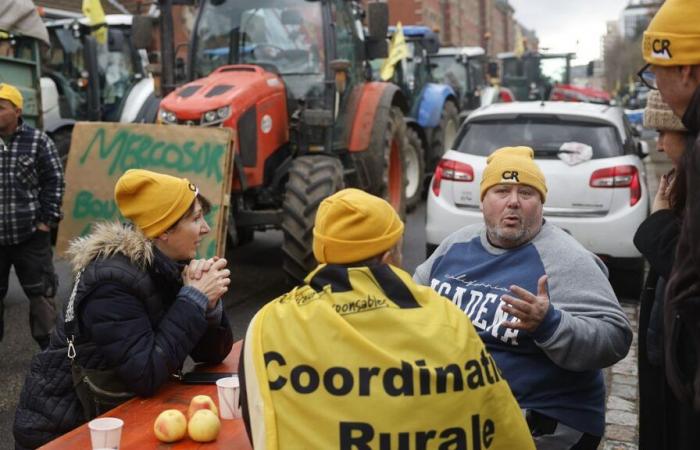French MPs validated the government’s opposition to the treaty in a vote Tuesday evening.
ADVERTISEMENT
It is a vote which takes on the appearance of a mine-clearing operation for the French government in the face of the anger of farmers, but could its significance prove to be only symbolic?
In a complicated political context, deputies spoke out against the free trade agreement between the EU and the Mercosur countries, by 484 votes for and 70 against during a vote in the National Assembly on Tuesday evening.
France still hopes to influence the negotiations led by the European Commission, and achieve a blocking minority by rallying four other Union countries, representing 35% of the European population, to its cause.
But in doing so, would it be relevant to block an agreement, the latest version of which was completed in June 2019? “This is not an agreement that was reached three weeks ago”in reference to the 25 years of discussions which led to the treaty in question.
“We must provide arguments, say why we are against”believes Pascale Joannin, political scientist and director of the Robert Schuman Foundation, recalling that “member states, including France, have transferred trade policy to the European Union”. “It has to be constructive, and keep things in perspective. There are aspects [de l’accord] which do not pose a problem, so we should not block the whole thing [des dispositions]”.
For its part, could the Commission try to force this text through?
“Non”estimates Pascale Joannin. “I think it would rather try to find a middle way. The Commission will undoubtedly look at the points which pose problems [pour la France]and examine them specifically”. “Articles concerning wines and spirits do not pose a problem, unlike those on food products, and in particular on meat.”
A call for nuance, therefore, in order not to harm the interests of the 27. “We must not shoot ourselves in the foot”she warns, evoking “the tour” of “Chinese president at the G20”. “If we want to play at scaring each other, we’ll be alone.”
It would therefore be appropriate to consider a certain number of legal tools, such as a “temporary application”or “the establishment of safeguards on certain points but not on others”so as to “send a message”.
Potential changes in which Patrick Martin-Genier, teacher at Sciences-Po Paris, is a specialist in European issues, hardly believes. The cause, first of all, is the procrastination which has long characterized Paris’ position on this issue.
“France was not necessarily opposed [à ce traité]”noting a turnaround linked to the mobilization of the agricultural world. “Tractors went all the way to the European Parliament, and this was something that had been underestimated”assures the academic.
“She has not always been active in trying to find an alternative or opposition to Brussels, given that we vote by qualified majority within the Council of Ministers”. But some states are now showing signs of hesitation, for reasons of domestic politics.
“There is indeed the possibility of obtaining a blocking minority, because Italy and Poland saw their farmers demonstrate last year”continues Patrick Martin-Genier.
“The Poles have been burned by agricultural competition from Ukraine (imports exempt from customs duties for products in this sector). In Italy, Giorgia Meloni is also encountering difficulties with her coalition, so the situation has evolved because that “It was still different two weeks ago.”
Germany, for its part, is witnessing the disintegration of Olaf Scholz’s coalition. The country is monopolized by a countryside, of which the social plans outline the backdrop, between the “cutting thousands of jobs at Bosch”cuts in the workforce at ThyssenKrupp, which will separate 40% of its employees, and the difficulties of the Volkswagen group, which has confirmed site closures.
The nickname of Mercosur, described as “cows against cars”, has never been so overtaken by the latest developments which are undermining industry across the Rhine, which are added to inflation which has been penalizing household consumption for several months. Cornered by difficulties, “Germany will not give up [sur la nécessité d’appliquer ce traité]”gauges this specialist.
Given the choices that marked the start of Ursula Von der Leyen’s second term at the head of the European Commission, should we expect compromises?
The President of the Commission did not fail to recall that “everything was decided in the final straight.”in a recent interview. “She is capable of obtaining an agreement in a hurry”notes Patrick Martin-Genier. “It is thanks to Giorgia Meloni that she was reappointed. And she listens less to France, which is weakened by the situation the country is experiencing today.”
“Ursula Von der Leyen is not going to give in to Paris”he decides,“everything will be decided at the last moment”taking up the example of the Brexit negotiations, which dragged on before reaching a crucial turning point in the weeks preceding the adoption of the agreement five years ago.
“In the event of a blocking minority, a review clause, for example, can be put in place. But in Parliament, a majority [de députés]of a more liberal tendency, are in favor of Mercosur”, with a view to “ratifying it”. “The President of the Commission therefore still has an ace up her sleeve”she who had specified that he was “there is no question of reopening negotiations on the agricultural aspect.”






